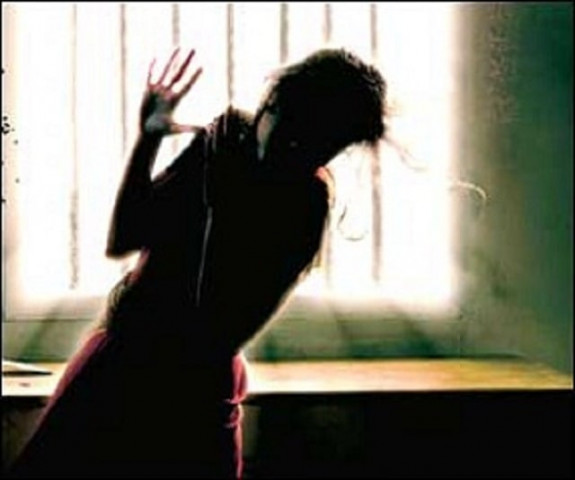'No more beatings': Sierra Leone's husband schools take on domestic violence
Persuaded by a social worker to stop beating his wife, Kanu decided to go to school

Police officers believe that the victim was under great pressure from her family to withdraw allegations against her ex-husband. PHOTO: REUTERS
The beatings he dished out made him a familiar face to the police in his hometown in the lush and leafy region of Bombali. One particularly vicious assault - delivered with his fists and belt - left Kanu's wife of 18 years with bloodied eyes.
'It must be love': wife-beating a source of pride for some in Mauritania
"I was totally wicked", Kanu, 52, told the Thomson Reuters Foundation, sitting in a chair in a small meeting room, while his wife Aminata crouched nearby.
"If any of our five children misbehaved and I beat them, she would come to question me about it, and I beat her too," Kanu said.
"She was provoking me because she pays the bills by selling the potatoes and groundnuts she grows. I had no job."
Persuaded by a social worker to stop beating his wife, and determined to be a better husband, Kanu took an unusual step. He decided to go to school. Kanu is one of more than 10,000 men in Sierra Leone to have enrolled at 'husband schools' - where they attend monthly
classes to learn about gender equality, domestic violence, sexual and reproductive health and female genital mutilation.
From War to Ebola
While domestic violence is a global scourge, women in Africa put up with being beaten - for arguing, refusing to have sex, going out without permission - far more than those in the rest of the developing world, said a 2016 report from the World Bank.
One in two African women say they accept domestic violence, while about a third have suffered such abuse, the report found. Domestic violence is widespread across the continent because men tend to see women as their property, while enduring a bad marriage is seen by society as a sign of a women's strength, said Ayodeji Owosobi, executive director of Stand to End Rape.
"That belief does something to a man's psyche," said Owosobi, head of the Nigeria-based civil society group.
"It tells him that regardless of what he does, the woman will stay so violence has become normalised," Owosobi added.
"So, children see abuse in the family as a standard of masculinity, and a necessary correctional measure in the home."
Struggling to get by in a country haunted by civil war and devastated by the world's worst Ebola outbreak, which infected 14,000 people and killed about 4,000 in Sierra Leone between 2014 and 2016, many men are lashing out against their wives.
Man who kidnapped and raped ex-wife in hidden 'dungeon' jailed for 13 years
"Some men are still traumatised by the way they lost their families to Ebola", said Lois Roberts Simche, psychosocial lead officer of the ministry for social welfare, women and children.
"There is an increase in gender-based violence because most
men can't afford to take care of themselves and their families."
"No More Beatings"
At the three husband schools in Sierra Leone - which opened in 2012 after starting out in Niger - men not only learn about women's health, but are also actively encouraged to accompany their wives and families for services such as family planning.
The schools collect data on the men and their families to track their visits to health centres relating to antenatal care, sexually transmitted infections, and gender-based violence.
"All we do with the husband schools is all about improving health of the family as a unit," said Betty Alpha, programme coordinator at the United Nations Population Fund (UNFPA), which runs the schools with support from a local civil society group.
Community chiefs ensure that the husbands do not shirk their responsibilities, by enforcing the schools' resolutions as law.
"If a woman goes for antenatal care without her husband, she will not be seen until the husband goes, and that brings shame to him," said 66-year-old Moiwa Balley, a village chief in the southern district of Bo, who is also a member of the school.
The husband schools are paired with another initiative, the 'pamama programme', which sees men put into practice the lessons they have learned alongside their wives, and discuss issues such as the sharing of household tasks and the use of birth control. At one of the sessions, 35-year old Saidu Lamine, who used to regularly beat his wife, Fati, and deny her money for food, said the school had changed his life, and made him a 'good man'.
Listening to her husband, Fati could not contain her joy.
"He has changed - no more beatings," she said as Lamine held their baby boy. "He is now a good father and a good husband."
Old Habits Die Hard
While the husband schools strive to change the attitudes and behaviours of their students towards women, victims of domestic violence in Sierra Leone often lack support, and knowledge of
their rights and how to seek justice, women's rights groups say.
The West African nation passed a domestic violence law in 2007, punishing abuse by up to two years in jail and putting in place entitlements for survivors such as free medical care. Yet the law is rarely enforced, as victims pursuing justice must pay a doctor to produce a medical report to present to the police, and sometimes cover the cost of a lawyer, Simche said.
"Gender-based violence is more prevalent in rural communities ... and it's rather unfortunate that most people in these rural settings are not aware that domestic violence or sexual abuse are crimes," the Sierra Leonean civil servant said.
And for some husband school students, old habits die hard. "He still beats me but not as much as before he joined the school," said Aminata, Kanu's wife, her body pocked with scars and welts she insists are a result of her work on the farm.
"If I get the chance, and enough money, I will run away with the children to my hometown," she added.



















COMMENTS
Comments are moderated and generally will be posted if they are on-topic and not abusive.
For more information, please see our Comments FAQ